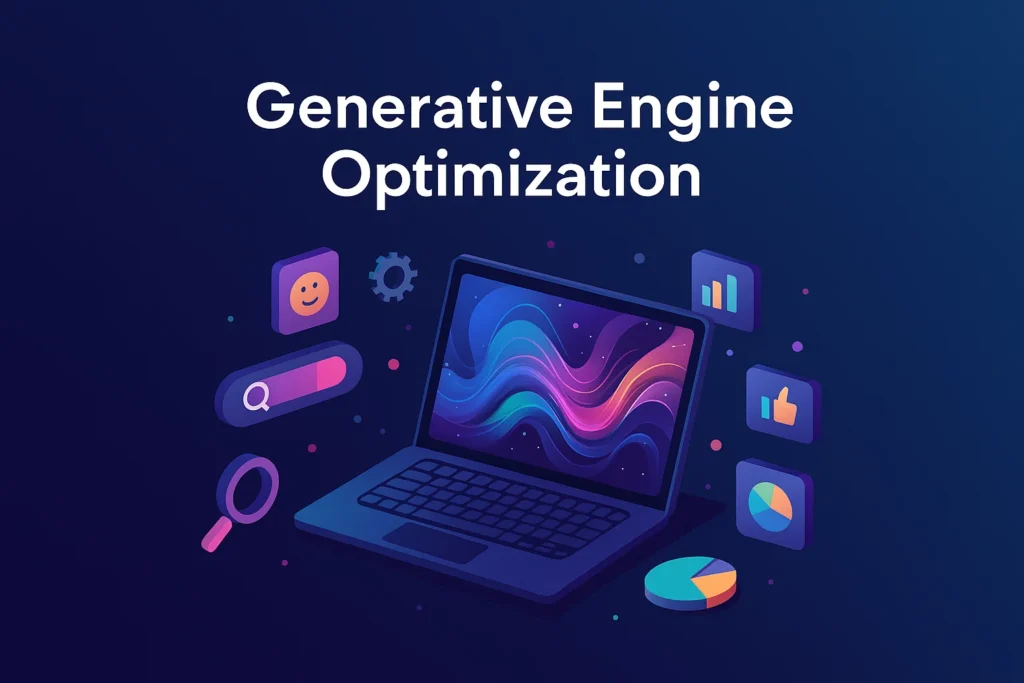Generative Engine Optimization (GEO) is an emerging field of digital marketing and content strategy focused on optimizing content for AI-driven generative engines like ChatGPT, Gemini, Claude, and Perplexity, rather than just traditional search engines like Google or Bing.
While SEO (Search Engine Optimization) helps rank content in search results, GEO ensures that your content is discoverable, understandable, and referenced correctly by generative AI systems when they produce answers.
🔑 Key Differences Between SEO and GEO
| Aspect | SEO (Search Engine Optimization) | GEO (Generative Engine Optimization) |
|---|---|---|
| Primary Goal | Rank higher in search engine results pages (SERPs). | Be referenced and surfaced in AI-generated responses. |
| Target Platform | Google, Bing, Yahoo, etc. | ChatGPT, Gemini, Claude, Perplexity, etc. |
| Content Format | Web pages, blogs, keyword-optimized articles. | Structured, contextual, fact-checked, and AI-readable content. |
| Optimization Focus | Keywords, backlinks, technical SEO, metadata. | Context clarity, structured data, citations, AI-trainable signals. |
| Measurement | Click-through rate (CTR), impressions, SERP ranking. | Mentions in AI responses, accuracy in AI citations, AI-driven traffic. |
| Future Scope | Established but evolving. | Still emerging—huge growth potential. |

📌 Core Components of GEO
- Structured Content
- Use clear headings, subheadings, tables, and lists.
- Helps generative AI parse information.
- Authoritativeness
- AI models prefer credible, authoritative sources.
- Cite original research, case studies, and verified data.
- Context-Rich Writing
- Avoid keyword stuffing.
- Write natural, explanatory, and detailed content.
- AI-Friendly Metadata
- Schema markup, FAQs, Q&A sections, and summaries help AIs extract context.
- Source Citations
- Include references to build trustworthiness for AI retrieval.
- Brand Presence in AI Training Data
- Publish across multiple platforms (blogs, LinkedIn, news sites).
- Increases likelihood of inclusion in AI training and retrieval.
📋 Best Practices for GEO
✅ Content Writing
- Write in question–answer format (helps AI when generating FAQs).
- Add statistics, definitions, and comparisons.
- Ensure clarity, precision, and depth.
✅ Technical Aspects
- Implement structured data (Schema.org).
- Provide machine-readable summaries.
- Use canonical tags and metadata.
✅ Branding & Authority
- Be cited on credible external sources.
- Increase digital footprint across platforms.
- Build topical authority around your niche.
📊 Example: GEO vs. SEO Content Style
| Query | SEO Style Answer | GEO Style Answer |
|---|---|---|
| “What is blockchain?” | “Blockchain is a distributed ledger technology used to store transactions securely across multiple nodes. It enables decentralization and immutability.” | “Blockchain is a decentralized ledger system where data (transactions, contracts, or records) is stored across multiple computers. It ensures security, transparency, and immutability. Examples include Bitcoin and Ethereum.” |
| Focus | Concise, keyword-driven. | Detailed, explanatory, with examples & context. |
What Our Clients Say
Trusted by contractors and local businesses for proven Local SEO Services.
John M. – General Contractor
“These guys transformed my Google Maps ranking. More calls, more local leads, and better visibility!”
Sarah L. – Roofing Business
“Within 3 months, my business went from page 3 to the top 3 listings. Highly recommend their Local SEO service!”
David K. – Plumbing Services
“Affordable and effective SEO. My local service calls doubled in less than 90 days.”
🚀 Future of GEO
- AI-first indexing: Generative models may use GEO-optimized signals as ranking factors.
- Voice assistants integration: Smart speakers will rely heavily on GEO.
- Brand personalization: Companies will fight for AI mentions over SERP rankings.
- New analytics tools: Platforms will track AI-generated traffic sources.
✅ Final Takeaway:
Generative Engine Optimization (GEO) is the next evolution of SEO. Businesses that adapt early by producing structured, authoritative, and AI-friendly content will dominate AI-driven discovery in the coming years.
GEO focuses on AI-generated answers, while SEO targets search engine rankings. Both overlap, but GEO emphasizes structured, fact-based, and explanatory content.
Because users increasingly ask AI assistants for answers instead of browsing SERPs. If your content is not optimized for AI, your brand may get overlooked.
Not entirely. SEO remains essential for web traffic. GEO complements SEO by ensuring visibility inside AI-driven platforms.
FAQ pages
Tutorials and how-to guides
Research-backed articles
Comparison tables and lists
Track mentions in AI responses (tools are emerging).
Monitor AI-driven referral traffic.
Analyze brand presence in AI-generated content.
Education (tutorials, guides)
Healthcare (trusted medical info)
Finance (definitions, market analysis)
Tech & SaaS (how-to integrations, comparisons)
No. Small businesses and creators can benefit by producing niche, high-quality, structured content that AI prefers.

Gulfam Qamar is a seasoned Local SEO expert with a proven track record of helping businesses boost their online visibility and dominate local search results. With deep expertise in Google Business Profiles, on-page optimization, and local citation strategies, Gulfam helps brands connect with nearby customers and grow sustainably. When he’s not optimizing websites, he’s sharing actionable SEO tips and insights to empower small businesses in the digital space.

